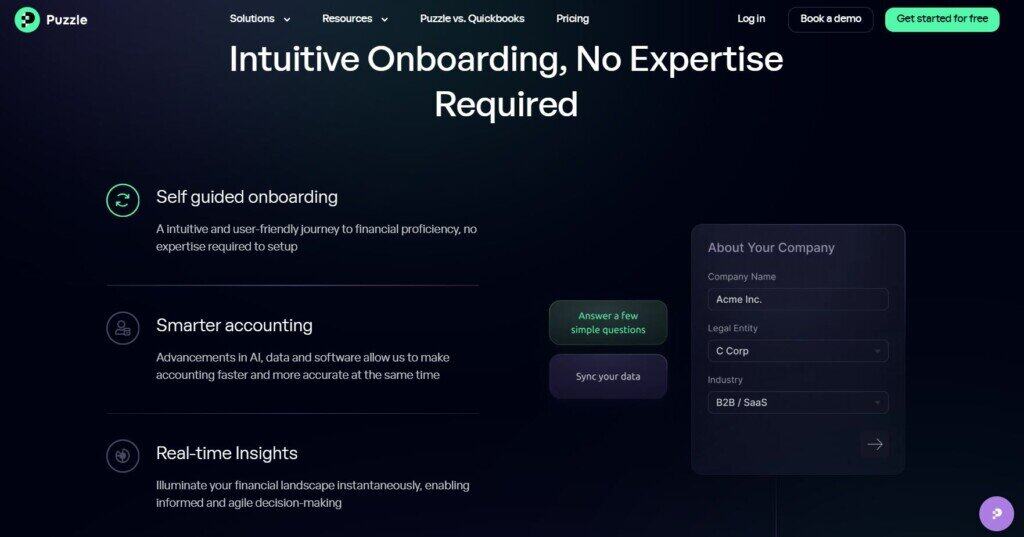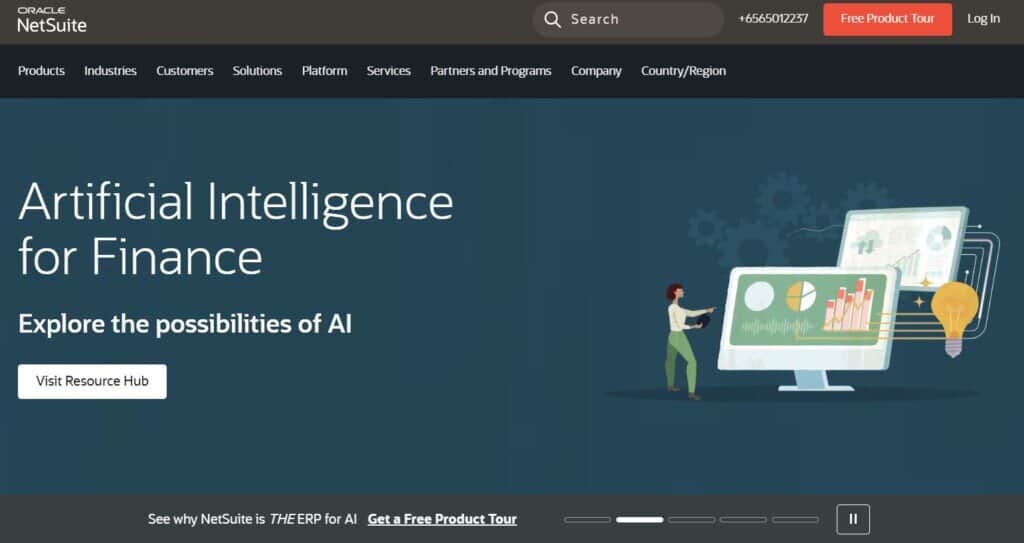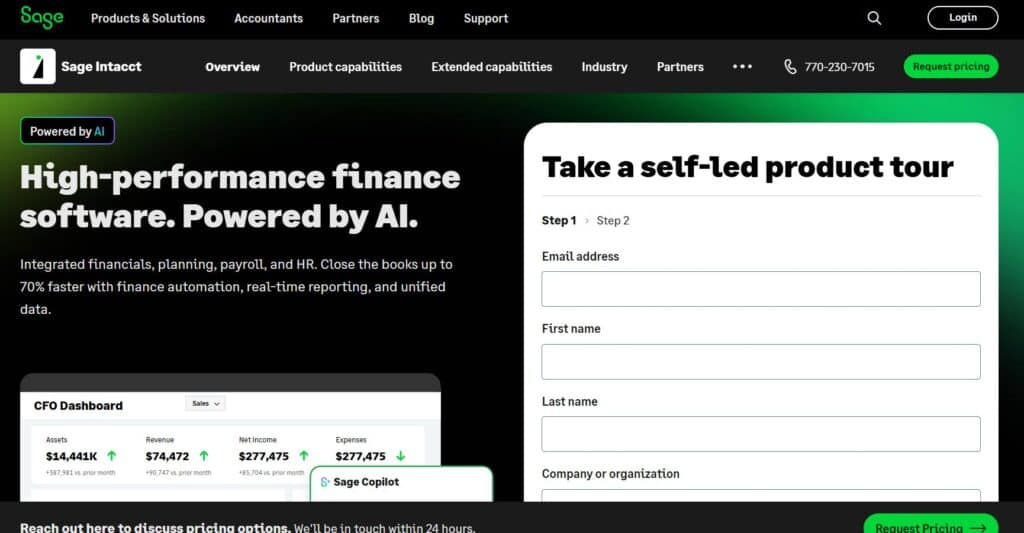- Bottom Line Up Front
- Why Technical Accounting Matters for Digital Businesses
- The Four Best Technical Accounting Softwares
- 1. Puzzle.io
- 2. NetSuite
- 3. Sage Intacct
- 4. QuickBooks Advanced + Add-Ons
- Why Digital Businesses Should Care About Technical Accounting
- Comparing the Four Softwares
- Feature Deep Dive: What Really Matters in Technical Accounting Software
- My Recommendations by Stage of Growth
- Closing Thoughts
Last Updated on September 17, 2025 by Ewen Finser
As a CPA who has spent years in the trenches of both public practice and industry, I’ve seen the same problem over and over again: fast-growing digital businesses relying on accounting tools that can’t handle the technical side of their financial reporting. They may be fine for simple invoicing, paying bills, or keeping track of cash, but when it comes to things like revenue recognition, deferred liabilities, contra accounts, or fixed asset schedules, many businesses just end up dropping the ball.
That’s where having superior accounting software comes into play. These platforms go beyond bookkeeping, they’re built to manage the rules, adjustments, and reconciliations that CPAs like me care about. If you’re running a digital business and you want clean audit trails, accurate GAAP reporting, and less fire-drill work at month-end, you need to pay attention to the software you’re using to assist in running your business.
Bottom Line Up Front
Businesses, especially digital businesses, can’t afford to ignore technical accounting scenarios. It’s the difference between clean, GAAP-compliant books and last-minute fire drills when investors or auditors come knocking.
- If you’re small, QuickBooks can limp along with discipline and tons of plug ins.
- If you’re growing fast, Puzzle provides the best mix of automation and accuracy for modern digital models.
- If you’re mid-market, Sage Intacct offers structure without ERP overhead.
- And if you’re aiming for the public markets, NetSuite is the heavyweight.
As a CPA, I’ve lived through messy cleanups and smooth audits alike. The businesses that succeed long term are the ones that invested early in the right system for their stage. Technical accounting isn’t just about compliance, it’s about building a financial foundation you can trust.
Why Technical Accounting Matters for Digital Businesses
Digital businesses grow fast. Subscription models, SaaS contracts, revenue that spans multiple periods, equity financing, and deferred revenue are all part of the picture. If you don’t have the right tools, you’re left juggling:
- Revenue accruals: booking revenue when it’s earned, not just when cash comes in.
- Deferred liabilities: tracking obligations like prepaid subscriptions or customer deposits that need to be recognized over time.
- Contra accounts: handling discounts, chargebacks, and allowances without distorting top-line numbers.
- Fixed asset tracking: making sure depreciation and disposals are handled properly and consistently.
I’ve worked with clients who relied solely on QuickBooks or Xero and then tried to raise capital. Investors and auditors spotted gaps in their accounting treatment almost immediately. These weren’t bad businesses—they just didn’t have systems that supported technical accounting.
The Four Best Technical Accounting Softwares
Over the years, I’ve tested and implemented a range of solutions. Here are four that stand out today. Each approaches technical accounting in a slightly different way, and which one is best depends on your size, complexity, and goals.
1. Puzzle.io
I’ll start with Puzzle.io because it’s a platform I’ve seen more startups adopt recently. Puzzle is built with digital-first businesses in mind, and it leans heavily on automation and AI. Where traditional accounting systems require endless manual journal entries, Puzzle tries to handle recognition rules and adjustments automatically.

Key strengths I’ve seen:
- Revenue recognition automation: it maps cash receipts against contracts and applies accrual schedules without you needing to build complex spreadsheets. It’s all built within the software itself.
- Deferred liabilities tracking: it can create and roll forward schedules that tie directly into your general ledger.
- Contra accounts built in: discounts, credits, and refunds flow through cleanly instead of muddying up revenue totals. As a CPA who’s been in dozens of systems, you’d be surprised at how often something as simple as a Contra GL account can not be created in other systems.
- Fixed asset management: depreciation schedules update automatically and tie back to your trial balance.
From a controller’s seat, Puzzle shines during month-end close. Instead of wrangling with reconciliations and adjusting entries, much of the heavy lifting is already done. It’s not perfect as custom reporting can still feel limited compared to a mature ERP, but it’s clear they’ve built the system with modern accounting workflows in mind.
2. NetSuite
NetSuite has long been one of the heavy hitters for mid-market companies, and for good reason. It offers a robust accounting suite with deep technical functionality. Unlike lighter systems, it’s designed from the ground up to handle complex revenue recognition, consolidation, and compliance. It’s also way too heavy and absolute overkill for most small businesses. But in terms of technical accounting, it can’t be beat.

Strengths worth highlighting:
- Advanced Revenue Management (ARM): supports ASC 606/IFRS 15 revenue recognition rules, making it strong for SaaS and subscription businesses.
- Fixed asset module: schedules, impairments, and disposals flow automatically into your ledger.
- Multi-entity and consolidation: for businesses expanding globally or with multiple subsidiaries.
- Audit trails: every adjustment is tracked and reportable, every time.
The downside is cost and complexity. If you’re a small business or start up, you’ll choke on NetSuite’s setup fees and ongoing maintenance. You need either internal NetSuite admins or outside consultants to keep things running smoothly. Still, for companies hitting $30M+ revenue and thinking about IPO track, it’s a heavyweight option.
3. Sage Intacct
Sage Intacct sits somewhere between lightweight bookkeeping systems and full ERP. It’s strong on core accounting but has modules that support technical areas without the full overhead of NetSuite. It can be a great fit for many mid size and growing businesses.

Where it stands out:
- Deferred revenue tracking: schedules link directly to invoices and contracts.
- Expense and liability accruals: built-in workflows reduce reliance on spreadsheets.
- Fixed assets: not as deep as NetSuite, but strong enough for most businesses
- Dimensional reporting: lets you slice financials by project, department, or customer.
In my experience, Intacct is a great fit for service-based digital companies (agencies, SaaS firms, marketplaces) that want stronger controls than QuickBooks but aren’t ready for the full ERP leap. It’s cloud-based and integrates well with CRMs and billing tools, which makes it flexible for digital operations. However, I recommend a team of last three or four in the accounting department, and a business that can handle higher costs.
4. QuickBooks Advanced + Add-Ons
It may surprise some people that I still include QuickBooks on this list. Out of the box, QuickBooks is not a technical accounting platform, it’s a general bookkeeping system. But with the right add-ons and custom processes, I’ve seen it stretched surprisingly far. Sometimes it works out, and other times it doesn’t.

For example:
- Fixed assets: tools like Sage Fixed Assets or Asset Panda can bolt on for depreciation tracking. You can also pay for the highest tier and unlock the FAM within QBO (but it’s very pricey).
- Revenue accruals: third-party tools and custom journal templates help manage earned vs. received revenues
- Deferred liabilities: schedules can be tracked in Excel and imported monthly, so it’s possible, but annoying.
- Contra accounts: In my experience, you do not have the ability to set up true contra GL accounts.
This isn’t my first choice for businesses that are scaling, but it can work. The key is discipline: you need strong accounting oversight and well-documented processes to avoid mistakes.
Why Digital Businesses Should Care About Technical Accounting
When I talk to founders, they often tell me: “We just need to know how much cash is in the bank and where it’s going.” I get it. Early on, survival is about cash flow. But here’s the thing…if you don’t build the technical foundation early, you’ll pay for it later.

Investor Expectations
When you go out for a seed or Series A round, investors want more than bank balances. They’ll ask:
- Are your revenues GAAP compliant? This should translate to, “are you accruing expenses, tracking depreciation, and deferring revenue? Or are you leaving all of these expenses out to show us too good to be true financials.
- How much deferred revenue sits on your balance sheet? This is them asking what’s been paid in, but not earned.
- Are your liabilities fully captured? This is an example of them asking about your deferred expenses. All these technical items quickly blend together.
If you can’t produce those numbers quickly, you lose credibility.
Audit Readiness
Audits aren’t just for public companies. I’ve worked with private firms asked for audited financials during M&A talks or debt financing. Without a proper system, audits turn into expensive, time-consuming cleanups.
Internal Decision-Making
Even before external stakeholders come into the picture, technical accounting helps leaders run their business. Knowing how much of your subscription income is recognized this month versus deferred changes how you budget. Tracking asset depreciation helps you plan for capital replacements. And contra accounts make sure you’re not overstating gross margins.
In other words: accurate books don’t just keep investors happy, they also keep management honest.
Real-World Use Cases That I’ve Ran Into
To bring this down from theory, here are situations where I’ve seen businesses stumble and thrive depending on their systems.
Subscription SaaS Revenue
A client of mine ran a SaaS. They were booking all of it as revenue on day one in QuickBooks. When an investor asked about monthly recurring revenue (MRR), their numbers looked inflated. We had to go back and rebuild 18 months of schedules. If they had Puzzle or NetSuite’s revenue recognition tools, that problem wouldn’t have existed.
Customer Deposits
A mid size construction firm that I worked with collected deposits on customer projects. Without proper liability tracking, deposits flowed into revenue prematurely. When some orders ultimately didn’t pan out due to financing, they had no liability account to offset refunds. With Intacct, this could have been handled cleanly.
Fixed Asset Tracking
Another business scaled quickly, buying vehicles and equipment. They tracked depreciation in spreadsheets. When using spreadsheets, we found it to almost be impossible to accurately reconcile depreciation and book value. That mistake nearly cost them a line of credit renewal due them not being able to quickly produce the book value of their assets. An integrated system like NetSuite or Puzzle would have prevented it.
Comparing the Four Softwares
Each platform fits a different stage of growth and complexity. Here’s a high-level comparison based on my experience:
- Puzzle.io
- Best for: startups and high-growth digital firms that want automation.
- Strength: automated revenue recognition, deferred liabilities, and contra accounts.
- Weakness: reporting depth is improving, but not yet at ERP level.
- NetSuite
- Best for: companies scaling past $30M, multi-entity, or considering IPO.
- Strength: deep compliance, global consolidation, audit trail strength.
- Weakness: cost, complexity, reliance on consultants.
- Sage Intacct
- Best for: mid-market firms that outgrew QuickBooks but aren’t ERP-ready.
- Strength: strong revenue and liability accruals, dimensional reporting.
- Weakness: fixed asset module is solid but less advanced than NetSuite.
- QuickBooks Advanced + Add-ons
- Best for: smaller digital businesses under $10M revenue.
- Strength: affordable, flexible with the right oversight.
- Weakness: manual processes, higher error risk, audit headaches.
Feature Deep Dive: What Really Matters in Technical Accounting Software
Fixed Asset Tracking
Depreciation is one of those areas that seems easy until it isn’t. Straight-line depreciation across a handful of laptops is simple enough. But once you introduce multiple asset classes, accelerated depreciation, disposals, and impairment testing, spreadsheets start breaking down.
- Puzzle.io: automates depreciation schedules and ties them directly into the trial balance. No re-keying.
- NetSuite: deepest fixed asset module, built for complex enterprises. Handles impairments and partial disposals.
- Intacct: solid coverage for most needs, but lacks the global consolidation features.
- QuickBooks: requires third-party add-ons, which means reconciling two systems.
Revenue Accruals
Accrued revenue is at the core of GAAP compliance for digital businesses. You want to recognize revenue when earned, not when cash hits.
- Puzzle.io: this is one of their strongest points, it applies rules across contracts and automates accrual schedules.
- NetSuite: highly configurable, supports ASC 606. Strong for SaaS and long-term contracts.
- Intacct: handles recurring revenue well, integrates with billing tools.
- QuickBooks: requires manual journal entries or outside tools. It runs the risk of inconsistencies.
Deferred Liabilities
Customer prepayments and deposits are liabilities, not revenue (this surprises a ton of people!). The right system keeps this distinction clear.
- Puzzle.io: Give the option to automatically books deferred liabilities and releases them as revenue when appropriate.
- NetSuite: robust, with clear audit trails.
- Intacct: effective for prepaid revenue, especially in service models.
- QuickBooks: possible, but only with discipline and careful manual oversight.
Contra Accounts
Refunds, discounts, and allowances should never inflate revenue. Contra accounts solve this, but not all systems handle them gracefully.
- Puzzle.io: integrates contra accounts directly into reporting.
- NetSuite: standard functionality, but requires configuration.
- Intacct: supported but not always intuitive for non-accountants.
- QuickBooks: In my experience, this is not an option within QBO.
My Recommendations by Stage of Growth
After years of watching businesses scale, and sometimes stumble here’s how I’d break it down:
- Bootstrapped / Pre-Seed: QuickBooks with CPA oversight. Don’t over-invest too soon, but put good processes in place.
- Seed to Series A: Puzzle. It will save you from spreadsheet chaos and give you the automation you need without ERP bloat.
- Series B to Mid-Market: Sage Intacct. At this stage, you want dimensions, tighter controls, and stronger liability tracking.
- Enterprise / IPO Track: NetSuite. It’s expensive and complex, but it’s the system auditors and regulators expect at scale.
Closing Thoughts
Look guys, I get that technical accounting principles such as these (there are many many more we didn’t cover!) are not fun to talk about! But they are so so important to consider when setting up an accounting software to run your small business. If you’re getting off the ground, QBO may be enough for you to scoot on by with. You may find yourself quickly outgrowing that solution, and I’d recommend Puzzle as a good software to use in the mean time. However, if you enjoy a ton of success and your business quickly ramps to $20MM of revenue YoY, it may be time to consider hiring a handful of accountants and implementing Sage Intacct or NetSuite. Regardless, when selecting your accounting software, don’t think about where you are, but where you may end up going in the coming years ahead.

